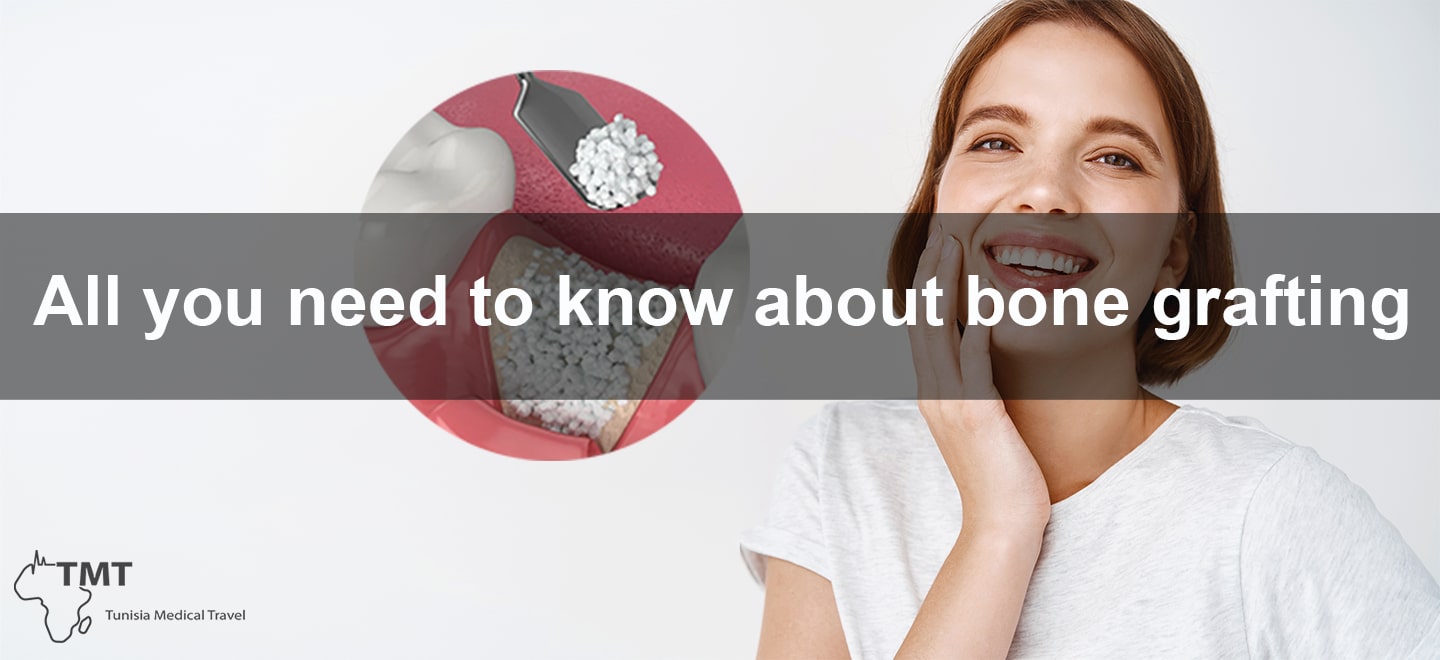All you need to know about bone grafting
All you need to know about bone grafting
What causes bone loss in the jaws?
There are several factors that can cause bone loss in the jaws, including:
- Periodontal disease : This is an infection of the gums and bone that support the teeth. If left untreated, it can lead to bone loss and tooth loss ;
- Tooth loss : When a tooth is lost, the bone that previously supported the tooth begins to resorb, or shrink away. Over time, this can lead to significant bone loss in the jaw ;
- Trauma : Trauma to the jaw can cause bone loss, either through direct injury or through the development of a non-healing fracture ;
- Infection : A severe infection in the jaw can cause bone loss, either through direct destruction of the bone or through the development of an abscess ;
- Genetics : Some people may be predisposed to bone loss due to genetic factors ;
- Medications : Certain medications, such as glucocorticoids and anticonvulsants can cause bone loss over time ;
- Medical conditions : Certain medical conditions such as osteoporosis, which causes a decrease in bone density, can lead to bone loss in the jaws ;
- Smoking : Smoking is a known risk factor for periodontal disease, which can lead to bone loss ;
It’s important to maintain good oral hygiene, visit the dentist regularly and address any dental problems as soon as they arise to prevent and slow down the process of bone loss. If you suspect you may have bone loss, it’s best to consult with a periodontist or an oral surgeon to determine the best course of treatment.
Who performs bone grafting for dental implants?
Bone grafting for dental implants is typically performed by an oral and maxillofacial surgeon or a periodontist. These are specialists who have the training and experience necessary to perform the procedure safely and effectively.
An Oral and Maxillofacial Surgeon(OMS) is a dentist who has completed additional training and education in the surgical management of diseases, injuries and defects in the head, neck, face, jaws, and the hard and soft tissues of the oral and maxillofacial region.
A Periodontist is a dentist who specializes in the prevention, diagnosis, and treatment of diseases and conditions affecting the tissues that surround and support the teeth.
Both oral and maxillofacial surgeons and periodontists are well-equipped to perform bone grafting for dental implants and have the necessary knowledge and experience to make sure the procedure is done correctly, safely and effectively.
It is important to check if the surgeon has the proper qualifications and experience before the procedure. And also, it’s important to discuss with the surgeon about the options available, the expected outcome, the recovery period and the costs involved.
Choosing the type of bone graft
Choosing the type of bone graft for a bone grafting procedure depends on a variety of factors, including the location and extent of the bone loss, the patient’s medical history, and the surgeon’s preference.
- Autografts : Autografts are considered the gold standard for bone grafting due to their high success rate and low risk of rejection or infection. However, obtaining autograft bone can be invasive as it requires a separate surgical procedure to harvest the bone, and it also has a recovery period ;
- Allografts : Allografts are widely available and can be used in a variety of applications. They can be a good option for patients who are not candidates for autografts or who have a limited amount of available autograft bone ;
- Xenografts : Xenografts are widely available and do not carry the risk of disease transmission, but there is a slight risk of rejection or allergic reaction. They are considered a good option for patients who are not candidates for autografts or allografts ;
- Alloplastic materials : These are synthetic bone substitutes that can be a good option for patients who are not candidates for autografts, allografts or xenografts. They are widely used in bone grafting procedures and are considered to be very safe ;
It is important to discuss with the surgeon about the options available and the expected outcome, the recovery period, and the costs involved. The surgeon will consider the patient’s medical history, the location and extent of the bone loss, and the patient’s goals and preferences before making a recommendation.

